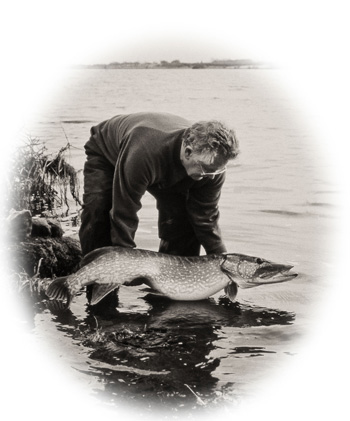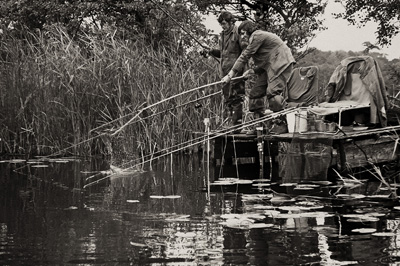Glancing behind me I could see my footprints where they’d flattened the dew-soaked grass. On my left the river flowed quietly, barely competing with the early morning birdsong and the soft sound of my tread. In the distance I could see the swim I was heading for and quickened my pace, excited anticipation fighting with my desire to tread quietly and leave the fish undisturbed. Barbel were my target and already, in my mind’s eye, I could see a big double engulfing my bait and I eagerly looked forward to the exhilaration of a great battle. Yet, as appealing as that was, most of what I wanted from fishing was all around me, the natural beauty of the countryside and a sense of wellbeing just by being there, and being part of it.
 That’s just one of many reasons for going fishing, but few people who have never wet a line wonder just what we anglers see in it. And unless someone has tried it, for a few weeks at least, then no angler is ever going to convince a non-angler that it is perhaps the most satisfying recreation known to man. Let’s be fair though, we anglers don’t have exclusivity in feeling like that; golfers, cricketers, rock climbers, possibly even Morris Dancers, and a host of other participants in other activities, will feel like that about their chosen escape.
That’s just one of many reasons for going fishing, but few people who have never wet a line wonder just what we anglers see in it. And unless someone has tried it, for a few weeks at least, then no angler is ever going to convince a non-angler that it is perhaps the most satisfying recreation known to man. Let’s be fair though, we anglers don’t have exclusivity in feeling like that; golfers, cricketers, rock climbers, possibly even Morris Dancers, and a host of other participants in other activities, will feel like that about their chosen escape.
Another thing that makes it difficult to describe what we get out of fishing is the absolute fact that it means different things to different people. My reason for going fishing could be vastly different to someone else’s reason. With no desire to be pretentious though, being as this is my book and presumably you’ve bought it to read what I have to say about fishing, I’ll tell you why I regularly take up rod and line, and have done at least once or twice every week for the past 60-odd years. By letting you know my reasons for fishing it will give you as good a clue as any as to the underlying theme of this book.
I could try to convince you that I go fishing because it appeals to my hunting instinct, that inbuilt urge in man to hunt for food, and I suppose there is a generous element of that. My primary reason though, for loving fishing, is much simpler than that, and I’ve already mentioned the key word: escape.
Fishing has, for as long as I can remember, offered me an escape from the involvement with, and responsibility of, everyday life. That involvement could have been traumatic at the time or simply tedious; it didn’t matter, fishing took me away from it and offered me peace and tranquillity, or excitement if I needed it. I could be investigative, introspective, laid back, active or just taking time out to daydream about winning the lottery. Fishing provides an opportunity for all those things; all you need to do is choose the species, the method and the venue to go with the mood.
For me, most of my fishing adventures have been seen as a challenge, a determination to catch the biggest fish a particular water could offer. I invariably chose fairly local waters that produced the biggest specimens of a particular species. Any species was fair game for me providing it grew to specimen proportions in waters that were within about 50 miles of my home. The only species I didn’t spend much time hunting, or at least not as much time as I spent seeking other species, were roach and perch. I just didn’t have them available to me in realistic numbers. For that reason the roach chapter in this book has been written by Mark Wintle (author of ‘Big Roach’, mPress), and the perch chapter by Gary Knowles, both of whom know their species extremely well and have caught more than their fair share of specimens. I have also left eels out of the book, even though I have caught them to over 6lb and at one time just loved fishing for them. However, they never have been a popular species and even less so today as they have unfortunately declined in numbers. Grayling are also absent, but again, they are not a hugely popular species with coarse anglers; more a fly fisherman’s species. I fly fish too, but this book is big enough and lines have to be drawn somewhere.
 Whatever species I’ve fished for I’ve gone after them with drive and determination. Both during fishing and in between fishing sessions I’ve studied the species I was targeting at the time, theorising different approaches and methods and then putting them into practice at the next available opportunity. I have never been happy to sit back and accept failure as being ‘just another bad day when the fish were not feeding’. There always had to be a reason and I would chase that reason like an addict chases his next fix. Of course, like any other angler, I had my fair share of blank sessions, sometimes more than what I thought was my fair share when things were not going according to plan. Without any false modesty though, I’m considered to be a successful angler.
Whatever species I’ve fished for I’ve gone after them with drive and determination. Both during fishing and in between fishing sessions I’ve studied the species I was targeting at the time, theorising different approaches and methods and then putting them into practice at the next available opportunity. I have never been happy to sit back and accept failure as being ‘just another bad day when the fish were not feeding’. There always had to be a reason and I would chase that reason like an addict chases his next fix. Of course, like any other angler, I had my fair share of blank sessions, sometimes more than what I thought was my fair share when things were not going according to plan. Without any false modesty though, I’m considered to be a successful angler.
I’ve written articles in most of the UK’s angling press for the last 40-odd years, and written in every issue of the now defunct Coarse Fisherman magazine (in its various guises) for over 30 years. That’s over 360 articles in one magazine alone. I’ve also written regularly for Europe’s biggest selling fishing magazine, Germany’s Blinker, and other foreign publications. I’m not telling you this for bragging rights, but to point out that the great majority of those articles were based on my approach to fishing, not about any step by step guide to catching fish, but the deeper, more thoughtful aspects of angling upon which my attitude to angling was always based.
This book has its foundations in many of those articles, although they have been expanded upon in the hope that I can pass on some of the things that have caught me fish over a great many years. What you won’t see in this book are any step-by-step guides about how to tie hooks and shot floats, but that doesn’t mean you will not learn anything about fishing. I sincerely hope the book will help you to learn the greatest lesson of all; how to think for yourself. If it goes some way to entertaining you and to inspiring you to think more deeply about your fishing and that in turn leads you to better and, most important, more enjoyable fishing, I will have achieved what I set out to do.
Signed hardback copies of Angling Essays are £25.00 plus P&P and available by mail order from Calm Productions










